Module 8 Unit 2
Module8 Unit2 课文翻译外研(三起)小学英语六年级上册

Module8 Unit2Module8 Unit2 (1)1Listen and chant.部分翻译 (1)2Listen and read.部分翻译 (1)3Listen and read.部分翻译 (3)4Listen and learn to say.部分翻译 (4)5Listen and say.Then chant.部分翻译 (4)6Ask and answer.部分翻译 (5)7Read and do.部分翻译 (6)1Listen and chant.部分翻译Listen and chant.听一听并说唱。
I'm always here.我总是在这里。
I never go.我从不走。
You're sometimes here.你有时在这里。
You often go.你经常走。
2Listen and read.部分翻译Listen and read.听一听,读一读。
Simon西蒙I always ride my bike to school. I never go by bus.我总是骑我的自行车去学校。
我从不乘公共汽车去。
Jack杰克I often eat with a knife and fork. But I like chopsticks.我经常用一副刀叉吃(饭)。
但是我喜欢筷子。
Sam萨姆I often go swimming. I like swimming in the sea.我经常去游泳。
我喜欢在大海里游泳。
Xiaoyu小宇I love English.I 0ften read English books.我喜欢英语。
我经常读英语书。
Heping和平I like writing stories.Sometimes,I write stories in English.我喜欢写故事。
有时,我用英语写故事。
Lili丽丽I sometimes clean the blackboard for my teacher.我有时为我的老师擦黑板。
三年级下册英语教案-Module 8《Unit 2 Daming flies a kite in t
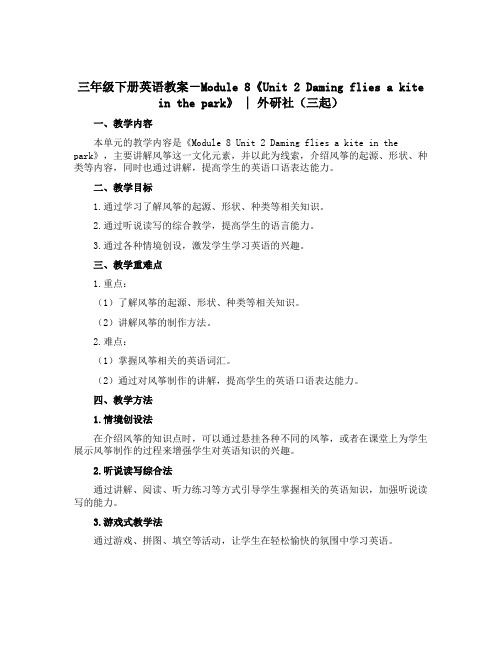
三年级下册英语教案-Module 8《Unit 2 Daming flies a kite in the park》 | 外研社(三起)一、教学内容本单元的教学内容是《Module 8 Unit 2 Daming flies a kite in the park》,主要讲解风筝这一文化元素,并以此为线索,介绍风筝的起源、形状、种类等内容,同时也通过讲解,提高学生的英语口语表达能力。
二、教学目标1.通过学习了解风筝的起源、形状、种类等相关知识。
2.通过听说读写的综合教学,提高学生的语言能力。
3.通过各种情境创设,激发学生学习英语的兴趣。
三、教学重难点1.重点:(1)了解风筝的起源、形状、种类等相关知识。
(2)讲解风筝的制作方法。
2.难点:(1)掌握风筝相关的英语词汇。
(2)通过对风筝制作的讲解,提高学生的英语口语表达能力。
四、教学方法1.情境创设法在介绍风筝的知识点时,可以通过悬挂各种不同的风筝,或者在课堂上为学生展示风筝制作的过程来增强学生对英语知识的兴趣。
2.听说读写综合法通过讲解、阅读、听力练习等方式引导学生掌握相关的英语知识,加强听说读写的能力。
3.游戏式教学法通过游戏、拼图、填空等活动,让学生在轻松愉快的氛围中学习英语。
1.导入通过播放关于风筝的视频,引导学生进入课堂学习氛围。
2.知识点讲解1.风筝的起源简单讲解风筝的起源和历史背景。
2.风筝的形状讲解风筝的形状和不同种类的风筝。
3.风筝的制作方法讲解如何制作风筝,并用英语表达相关的词汇。
3.游戏活动为了提高学生的学习兴趣,可以通过各种游戏活动来巩固学习内容,如拼图、填空、猜谜语等。
4.课堂总结通过课堂小结,总结本课所讲解的知识点,检查学生的学习成果。
六、课后作业1.听写要求学生进行一次听写,加深对所学知识的理解。
2.制作自己的风筝让学生回家制作一架自己的风筝,并描述制作过程用英语形式写成。
七、教学评估通过口头问答、笔试等方式,检查学生掌握风筝相关知识的情况,从而评估学生的学习成果。
Module_8_Unit_2

Zhang Yining’s mother advised her to study as well as train hard.
Zhang Yining was asked to go to Beijing Shichahai Sports School by Wang Biling.
Zhang Yining’s training programme took up a lot of her time.
A lot of Zhang Yining’s time was taken
Coach Wang Biling noticed Zhang Yining.
ZNhaonwgwYrinitiengsewnatesnncoetsicaebdobuyt tCaobalech WtaenngniBs iplilnagy.er Zhang Yining. Use the WancgorBrielicntgvearsbkefdorZmh.ang Yining to go to Beijing Shichahai Sports School.
5. take pride in以…为骄傲 Take pride in what you do. 为你所做的事感到自豪。
Part 4:Summarise
1.被邀请参加比赛 be invited to competitions
2.被选来代表中国队 be chosen for the Chinese team
• =sb. be chosen to do sth. • 6. warn sb. to do sth. 警告某人做某事
• = sb. be warned to do sth.
外研版九年级下册英语Module8 Unit2部分课文翻译
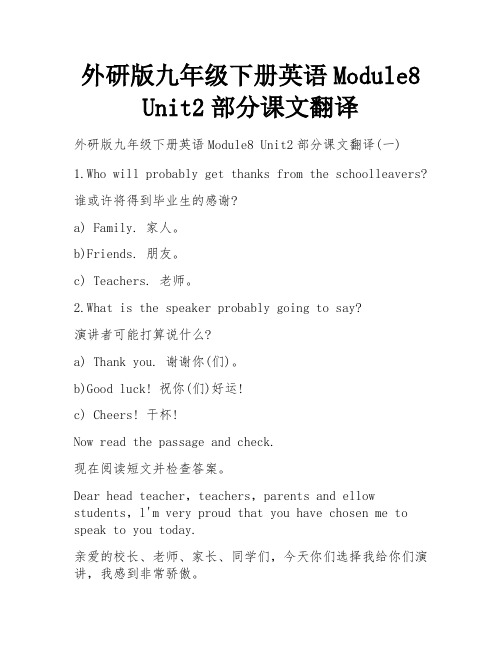
外研版九年级下册英语Module8 Unit2部分课文翻译外研版九年级下册英语Module8 Unit2部分课文翻译(一)1.Who will probably get thanks from the schoolleavers?谁或许将得到毕业生的感谢?a) Family. 家人。
b)Friends. 朋友。
c) Teachers. 老师。
2.What is the speaker probably going to say?演讲者可能打算说什么?a) Thank you. 谢谢你(们)。
b)Good luck! 祝你(们)好运!c) Cheers! 干杯!Now read the passage and check.现在阅读短文并检查答案。
Dear head teacher,teachers,parents and ellow students,l'm very proud that you have chosen me to speak to you today.亲爱的校长、老师、家长、同学们,今天你们选择我给你们演讲,我感到非常骄傲。
I have three roses here:a red one,a yellow one and a white one.These roses are to thank three groups of people for the three most important things that I have learnt. These three things are friendship,effort and trust.我这里有三朵玫瑰:一朵红的、一朵黄的和一朵白的。
这些玫瑰是用来表达我对三群人的感谢,因为我学会了三件最重要的事。
这三样东西是友谊、努力和信任。
I give the red rose to my triends.When I started school here.my Chinese was not good,and some of my mistakes were very funny.I once tried tosay“xiexie”,but f said“xiaxia”instead.of course some people laughed,and felt quite silly.But they were not laughing at me. They taught me to say many things in Chinese and kindly invited me to join them.Today,thanks to their kindness, my Chinese is much better,and we have bee friends.So,let mesay“xiexie”again to all of you for your help.我把红玫瑰送给我的朋友们。
六年级英语上册M8Unit2Ioftengoswimming知识清单外研版三起
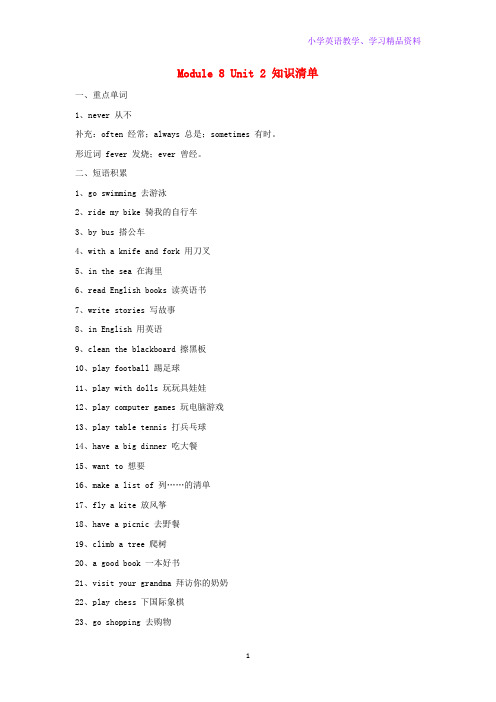
一、重点单词1、never 从不补充:often 经常;always 总是;sometimes 有时。
形近词 fever 发烧;ever 曾经。
二、短语积累1、go swimming 去游泳2、ride my bike 骑我的自行车3、by bus 搭公车4、with a knife and fork 用刀叉5、in the sea 在海里6、read English books 读英语书7、write stories 写故事8、in English 用英语9、clean the blackboard 擦黑板10、play football 踢足球11、play with dolls 玩玩具娃娃12、play computer games 玩电脑游戏13、play table tennis 打兵乓球14、have a big dinner 吃大餐15、want to 想要16、make a list of 列……的清单17、fly a kite 放风筝18、have a picnic 去野餐19、climb a tree 爬树20、a good book 一本好书21、visit your grandma 拜访你的奶奶22、play chess 下国际象棋23、go shopping 去购物25、drink tea 喝茶26、go to the doctor 去看医生27、collect stamps 收集邮票28、complete the table 完成表格29、watch TV 看电视30、play basketball 打篮球31、go to the supermarket 去超市32、cook dinner 做晚餐33、do homework 做家庭作业三、句型总结1、描述自己经常做某事:I often +动词原形(+其他)。
原句:I often go swimming.如果要表示别人经常做某事:主语+often+动词原形/动词第三人称单数(+其他)。
五年级上册英语教案-Module 8 Unit 2 I went to sam and Amy's
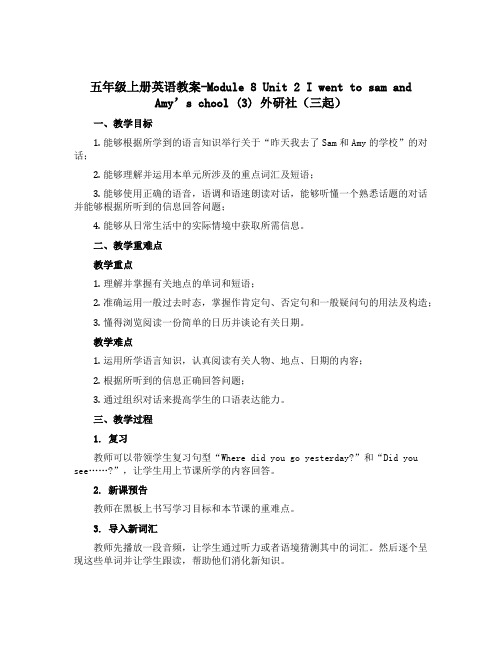
五年级上册英语教案-Module 8 Unit 2 I went to sam andAmy’s chool (3) 外研社(三起)一、教学目标1.能够根据所学到的语言知识举行关于“昨天我去了Sam和Amy的学校”的对话;2.能够理解并运用本单元所涉及的重点词汇及短语;3.能够使用正确的语音,语调和语速朗读对话,能够听懂一个熟悉话题的对话并能够根据所听到的信息回答问题;4.能够从日常生活中的实际情境中获取所需信息。
二、教学重难点教学重点1.理解并掌握有关地点的单词和短语;2.准确运用一般过去时态,掌握作肯定句、否定句和一般疑问句的用法及构造;3.懂得浏览阅读一份简单的日历并谈论有关日期。
教学难点1.运用所学语言知识,认真阅读有关人物、地点、日期的内容;2.根据所听到的信息正确回答问题;3.通过组织对话来提高学生的口语表达能力。
三、教学过程1. 复习教师可以带领学生复习句型“Where did you go yesterday?”和“Did you see……?”,让学生用上节课所学的内容回答。
2. 新课预告教师在黑板上书写学习目标和本节课的重难点。
3. 导入新词汇教师先播放一段音频,让学生通过听力或者语境猜测其中的词汇。
然后逐个呈现这些单词并让学生跟读,帮助他们消化新知识。
(1)新单词1.museum:博物馆2.cinema:电影院3.supermarket:超市4.bookstore:书店5.bank:银行(2)短语1.go to the cinema:去电影院2.go to the museum:去博物馆3.go to the bank:去银行4.go to the bookstore:去书店5.go to the supermarket:去超市4. 阅读练习为了让学生理解所学内容,教师给学生提供一些相关的阅读材料。
这些材料可以是文字,图片或者是真实场景的展示,并希望学生能够从中获得有关地方的信息。
五年级上册英语教学设计-Module8 Unit 2 There are lots of games
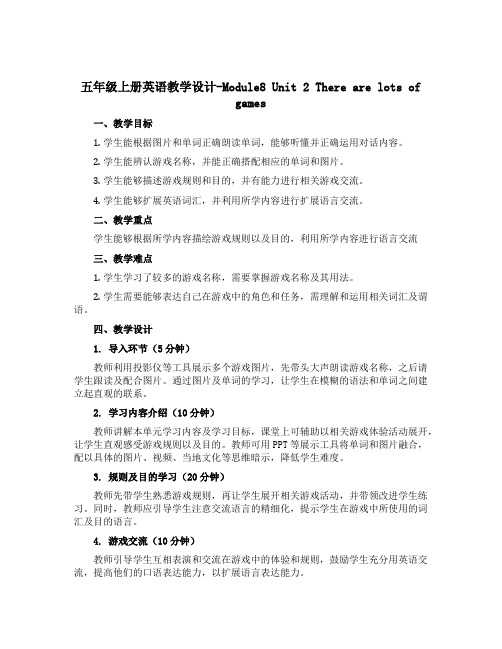
五年级上册英语教学设计-Module8 Unit 2 There are lots ofgames一、教学目标1.学生能根据图片和单词正确朗读单词,能够听懂并正确运用对话内容。
2.学生能辨认游戏名称,并能正确搭配相应的单词和图片。
3.学生能够描述游戏规则和目的,并有能力进行相关游戏交流。
4.学生能够扩展英语词汇,并利用所学内容进行扩展语言交流。
二、教学重点学生能够根据所学内容描绘游戏规则以及目的,利用所学内容进行语言交流三、教学难点1.学生学习了较多的游戏名称,需要掌握游戏名称及其用法。
2.学生需要能够表达自己在游戏中的角色和任务,需理解和运用相关词汇及谓语。
四、教学设计1. 导入环节(5分钟)教师利用投影仪等工具展示多个游戏图片,先带头大声朗读游戏名称,之后请学生跟读及配合图片。
通过图片及单词的学习,让学生在模糊的语法和单词之间建立起直观的联系。
2. 学习内容介绍(10分钟)教师讲解本单元学习内容及学习目标,课堂上可辅助以相关游戏体验活动展开,让学生直观感受游戏规则以及目的。
教师可用PPT等展示工具将单词和图片融合,配以具体的图片、视频、当地文化等思维暗示,降低学生难度。
3. 规则及目的学习(20分钟)教师先带学生熟悉游戏规则,再让学生展开相关游戏活动,并带领改进学生练习。
同时,教师应引导学生注意交流语言的精细化,提示学生在游戏中所使用的词汇及目的语言。
4. 游戏交流(10分钟)教师引导学生互相表演和交流在游戏中的体验和规则,鼓励学生充分用英语交流,提高他们的口语表达能力,以扩展语言表达能力。
5. 游戏扩展(10分钟)教师引导学生进一步探索游戏,提醒他们游戏规则及目的可以通过各种方式和不同文化背景的人互动共享。
同时,教师可对学生的口语表达进行适度修改和订正,以确认学生是否学好了英语。
五、教学反思本节课采用了整体教学贯穿始终,搭配多媒体工具和听力讲解较为简洁和明了。
游戏活动的设置及语言交流环节促进了学生表达能力的锻炼,满足了学生对生动活泼的吸引力。
外研版英语八年级上册Module8 Unit2 核心词汇讲解
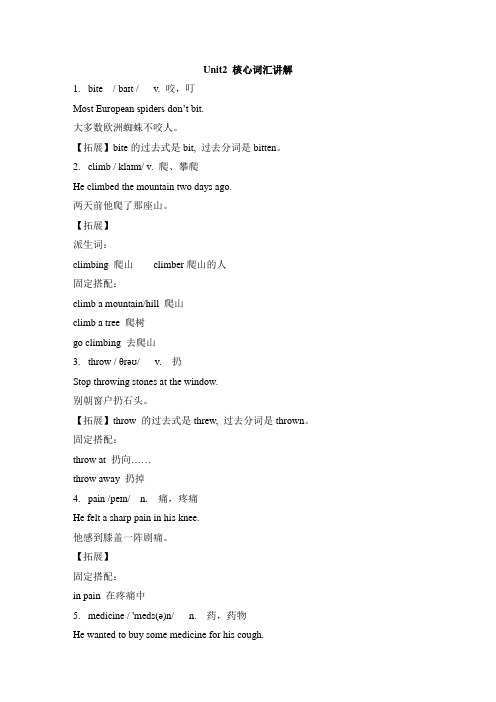
Unit2 核心词汇讲解1.bite / baɪt / v. 咬,叮Most European spiders don’t bit.大多数欧洲蜘蛛不咬人。
【拓展】bite的过去式是bit, 过去分词是bitten。
2.climb / klaɪm/ v. 爬、攀爬He climbed the mountain two days ago.两天前他爬了那座山。
【拓展】派生词:climbing 爬山climber爬山的人固定搭配:climb a mountain/hill 爬山climb a tree 爬树go climbing 去爬山3.throw / θrəʊ/ v. 扔Stop throwing stones at the window.别朝窗户扔石头。
【拓展】throw 的过去式是threw, 过去分词是thrown。
固定搭配:throw at 扔向……throw away 扔掉4.pain /peɪn/ n. 痛,疼痛He felt a sharp pain in his knee.他感到膝盖一阵剧痛。
【拓展】固定搭配:in pain 在疼痛中5.medicine / 'meds(ə)n/ n. 药,药物He wanted to buy some medicine for his cough.他想买些治他咳嗽的药。
【拓展】固定搭配:take medicine 吃药派生词:medical 医学的,医疗的。
He studies at a medical college. 他在一所医学院学习。
外研版小学英语三年级第二册Module8Unit2教材内容全解
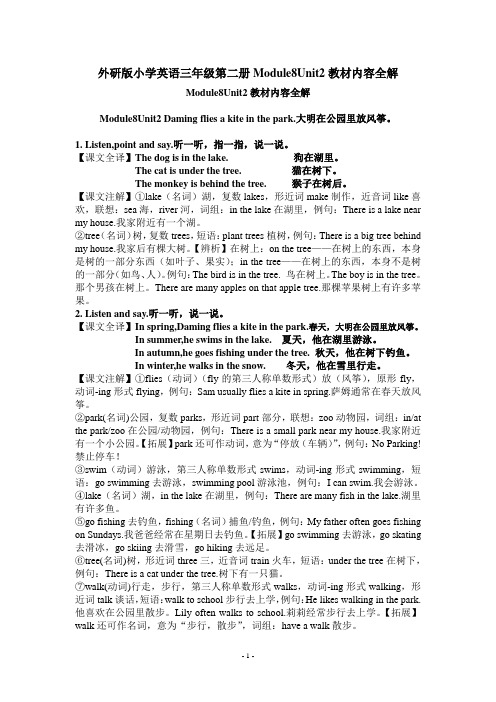
外研版小学英语三年级第二册Module8Unit2教材内容全解Module8Unit2教材内容全解Module8Unit2 Daming flies a kite in the park.大明在公园里放风筝。
1. Listen,point and say.听一听,指一指,说一说。
【课文全译】The dog is in the lake. 狗在湖里。
The cat is under the tree. 猫在树下。
The monkey is behind the tree. 猴子在树后。
【课文注解】①lake(名词)湖,复数lakes,形近词make制作,近音词like喜欢,联想:sea海,river河,词组:in the lake在湖里,例句:There is a lake near my house.我家附近有一个湖。
②tree(名词)树,复数trees,短语:plant trees植树,例句:There is a big tree behind my house.我家后有棵大树。
【辨析】在树上:on the tree——在树上的东西,本身是树的一部分东西(如叶子、果实);in the tree——在树上的东西,本身不是树的一部分(如鸟、人)。
例句:The bird is in the tree. 鸟在树上。
The boy is in the tree。
那个男孩在树上。
There are many apples on that apple tree.那棵苹果树上有许多苹果。
2. Listen and say.听一听,说一说。
【课文全译】In spring,Daming flies a kite in the park.春天,大明在公园里放风筝。
In summer,he swims in the lake. 夏天,他在湖里游泳。
In autumn,he goes fishing under the tree. 秋天,他在树下钓鱼。
四年级上册英语教案-Module 8《Unit 2 Sam is going to ride hor

四年级上册英语教案-Module 8《Unit 2 Sam is going to ridehorse》|外研社(三起)一、教学内容本节课教学内容为外研社(三起)四年级上册英语教材Module 8《Unit 2 Sam is going to ride horse》二、教学目标1.知识目标•掌握本节课的生词:ride, horse, sheep, cow•学会以正确的发音与语调表达本课中的单词和句子。
•熟悉课文内容,理解故事情节。
2.能力目标•能够听懂关于“动物运动”的简单对话。
•能够模仿示范,用正确的语音和语调朗读课文。
•能够自己编造关于“动物运动”的对话,并表达出来。
3.情感目标•培养学生的兴趣、爱好,激发他们对英语的学习兴趣,并更好地了解动物运动。
三、教学重难点1.教学重点•教授本课的生词:ride, horse, sheep, cow•学生能够听懂并复述关于“动物运动”的简单对话。
•学生能够熟悉本节课的故事情节。
2.教学难点•学生能够运用所学的单词和语言进行表达。
•学生能够自己编造对话,并表达出来。
四、课前准备•打印学生手册.•一个动物运动相关的视频或动画片。
五、教学流程步骤一:课前热身(5分钟)让学生们看一段关于动物运动的动画片或视频,使学生们对动物运动有基本的了解和认识。
步骤二:新授生词(10分钟)引导学生从音、形、义三个方面来学习本课的新单词:ride, horse, sheep, cow。
可以通过图片、实物等方式给学生展示相应的单词,并引导学生记忆单词的发音、拼写和中英文义项。
步骤三:朗读课文(10分钟)安排地的同学齐读课文,鼓励同学们模仿示范,用正确的语音和语调朗读出课文中的单词和句子。
步骤四:角色扮演(10分钟)在角色扮演环节,教师扮演一个马骑手,学生扮演马儿、绵羊和奶牛,运用课堂上所学到的新词汇“ride”,“horse”,“sheep”和“cow”,模仿马儿、绵羊和奶牛的叫声,对话。
外研版八年级英语上册Module 8 Unit 2(含音频)

He _th_r_e_w_ the snake across the kitchen. He _s_ta_y_e_d__ cool and _to_o_k_ a photo of the snake. Soon he w__e_n_t to hospital and _sh_o_w__e_d_ the photo to the doctors.
climb hide hurt medicine pain throw
A snake (1) _c_l_im__b_e_d__ out of a box of bananas and (2) _h__id_____ somewhere. When Henry was working, the snake bit him.
How did the The doctors _s_en__t the photo to a zoo.
doctors save Then they g_a_v__e Henry the right
his life?
_m_e_d_i_c_in_e_.
Read the passage quickly and answer the questions.
✔a) his hand was hurting
b) he had a photo of the snake c) the doctors called him on his mobile phone
4 The doctors gave Henry the right medicine after ______.
✔a) they knew what kind of snake bit him
b) they saw the snake in the photo c) he left hospital the next day
外研版英语九年级上册 Module 8 Unit 2 知识清单

外研版英语九年级上册Module 8 Unit 2 知识清单M8U2知识点1.proud adj.自豪的;自尊的;自傲的pride n. 自豪, 得意be proud of 以……为荣、自豪=take pride ine.g The new car was the pride of the whole family.2.effort 努力,尽力put effort into sth.对某事付出很大力气spare no effort 不遗余力without effort 不费力 a waste of time and effort时间和精力的浪费make an effort 努力make every effort 竭尽全力ugh at 嘲笑;一笑置之e.g It is unkind to laugh at a person in trouble.4. join V, 意为"参加, 加入", 加入某个组织或团体,join sb.的意思是"加入到某(些)人之中;与某(些)人一起"。
如:e.g Will you join the school music clube.g Will you join us“join in +活动”表示“参加某项活动”。
take part ine.g They are going to join in the singing.e.g Jane is going to join in the volleyball match next week.5.try one’s best 尽某人最大的努力do one’s beste.g I will try my best to improve my English6. disappointed adj. 失望的disappointed指“对......(人/物)感到失望的”, 表示主观感受be disappointed with/ in sb. 对某人感到失望be disappointed at/by sth. 对某事感到失望be disappointed to do sth. 对做某事感到失望disappointing指“令人感到失望的”, 事物自身具备的性质。
Module8Unit2Wethoughtsomebodywasmovingabout.知识点课件英

above prep. 在……上面 above, over与on
by prep. 在……旁边 Look!They are standing by the fire, singing and dancing. 看!他们站在炉火旁唱歌、跳舞。
by作介词的其他用法:
by+表示时间的名词
Some of them look like humans while others look like wild animals. 它们有些看起来像人,而有些看起来像野兽。(教材P66)
human /ˈhjuːmən/ n. 人 与human being同义,常用复数形式humans。Dogs can hear much better than humans. 狗的听觉比人灵敏得多。Like tree leaves, no two human beings are exactly the same. 就像树叶一样,没有两个人是完全一样的。(河北中考)
somebody /ˈsʌmbədi/ pron. 某人;有人 作复合不定代词,意为"某人;有人",相当于someone。somebody作主语时,谓语动词用单数形式。Listen! Somebody is singing. 听!有人在唱歌。
We thought somebody was moving about. 我们原以为是有人在四处走动。(教材P66)
We thought...我们原以为…… thought后的宾语从句用过去时态的某种形式。We thought the rabbit was dead. But after a while it jumped up and ran away. 我们原以为这只兔子死了。但过了一会儿它跳起来跑开了。
Module8----unit2

I can do it!
What will you do tomorrow? We will go to the library tomorrow.
What will you do tomorrow? I will play football tomorrow.
一、按照要求写单词:
1.draw (过去式) ;2.China (形容词)
二、英汉短互译
3.一张纸
;4.这是一个棒主意
5.玩具飞机怎样
;
三、翻译句子:
6. ---你明天将做什么?
---我明天将做作业。
; ;
Module8
Unit2---I made a kite.
1. drew draw 的过去式,画 Usage1:draw a dragon 画了一条龙 For example:Daming drew a dragon yesterday. 2. cut 动词:剪、切、割 过去式 cut usage1: cut a paper 剪开一张纸
For example : I’ll paint the dragon red.
5. stick 名词: 小木棍、小木条
Usage1: some sticks 一些木条
For example:I put some sticks on the desk.
6. tie
动词:系上、扎上 过去式: tied
(动词)画 过去式 drew (动词)剪,切, 割 过去式 cut
(名词) 张,片,块 (动词) 用染料绘画,着色
(动词) 放,安放 过去式 put (名词) 小木棍,小木条 (动词) 扎上,系上 过去式tied
Module 8 unit 2 Line is longer
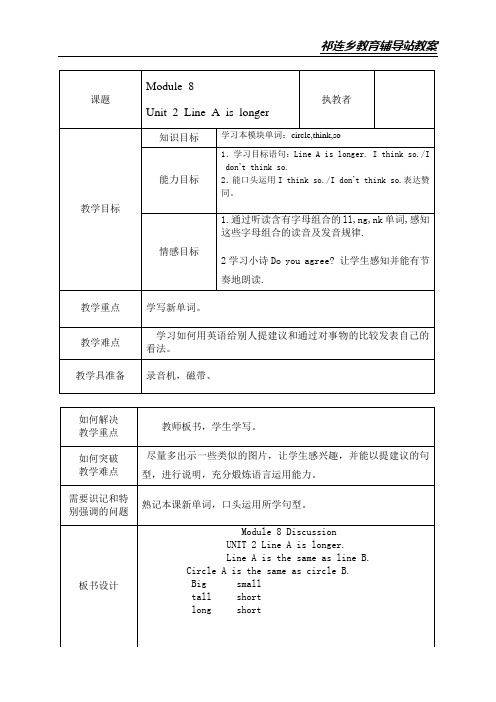
1.通过听读含有字母组合的ll,ng,nk单词,感知这些字母组合的读音及发音规律.
2学习小诗Do you agree?让学生感知并能有节奏地朗读.
教学重点
学写新单词。
教学难点
学习如何用英语给别人提建议和通过对事物的比较发表自己的看法。
教学具准备
录音机,磁带、
如何解决
教学重点
教师板书,学生学写。
课题
Module8
Unit2 Line A is longer
执教者
教学目标
知识目标
学习本模块单词:circle,think,so
能力目标
1.学习目标语句:Line A is longer. I think so./I don’t think so.
2.能口头运用I think so./I don’t think so.表达赞同。
Get the students talk about pictures.
“the same as”
Listen and repeat.
Listen and repeat.
Read it by youselves.
Get the students do the activities.
课后反思
1.Revise the long-short, big-small, tall-short .
2.Show the pictures of the text.
1.Show the pictures of the text and play the tape.
2.Play the tape again.
Circle A is the same as circle B.
- 1、下载文档前请自行甄别文档内容的完整性,平台不提供额外的编辑、内容补充、找答案等附加服务。
- 2、"仅部分预览"的文档,不可在线预览部分如存在完整性等问题,可反馈申请退款(可完整预览的文档不适用该条件!)。
- 3、如文档侵犯您的权益,请联系客服反馈,我们会尽快为您处理(人工客服工作时间:9:00-18:30)。
sportswoman (尤指职业的)女运动员
high jump跳高
hurdling跨栏赛跑 n.
ability n.能力 1). 表示抽象意义的“能力”,是不可数名词。 He is a man of ability.他是个有能力的人。 2). 若表示不同种类的能力,则可以用复数。 Men and women have similar abilities and needs. 男人和女人有相似的能力和需要: 3). 侧重指智慧、天资、天分等方面的意义时, 可数或不可数均可,有时还可用复数形式 The girl has a great musical ability. 这女孩很有音乐天才。 4). 表示能力做某事或具有做某事的能力等,其 后通常要接不定式。 He has the ability to speak English fluentl跨栏赛跑 n.
ability
hurdling
/'spɔ:tswʊmən/ 女运动员 n. /reis/ 赛跑;比赛 n. /'meθəd/ 方法;办法 n.
sportswoman
race
method
/'rikɔ:d/
记录. v.
最佳纪录 n. 跨栏赛跑n. 日本 n. 打破(记录),打碎
2012 2008 2004 2001 1998 1993
(Grade 4)
__ f g __ d __ a __ b e __ c __
1983
a). won his first international 110m hurdles race b). hurdling ability noticed c). born in Shanghai d). won Olympic gold medal e). started training at a sports school f ). returned to first place g). suffered from foot problem
2. Read the passage and choose the sentence which best expresses the main idea. a). Liu Xiang was helped by his sports school to win a gold medal. b). Liu Xiang will be a star and not a sports hero. c). Liu Xiang has trained for many years and won many gold medals.
Liu Xiang — trained to be the best in the world!
For Liu Xiang, life as a sports hero began in 2004. First, he was invited to competitions around the world. Then, he was chosen for the Chinese team at the Athens Olympic Games and won a gold medal. Liu X iang was not a successful sportsman at first. He was born in Shanghai on 13th July 1983, and started raining when he was very young. In Grade 4, he went to the Sports School of Putuo District of Shanghai. Liu was encouraged at first to train for the high jump.
/'rekɔ:d/
/'hə:dlz/ /dʒə'pæn/ /breik/ /'spɔ:tspə:sən/ /'eiʒən, 'eiʃən/
record hurdles Japan break sportsperson Asian
运动员 n.
亚洲的;亚洲人的 adj.
/'sʌfə/
患有(疾病等);经受 v.
8
Unit 2
He was invited to competitions around the world.
stand for是…的缩写;代表
memory记忆;回忆
point比分
seat座椅;座位
kick踢
mad生气的;恼火的
1. decide to do sth. 决定做某事
2. face the truth
2). Put up 指建造或搭起一个具有高度的物体, 口语中set up 和build也有此意。 They put up/set up a mew house. 他们搭建了一座新房子。 3). build建造,建立,建设。常指建造大东西。 They build their homes and made their farms there.他们在哪儿建立了家园,办了农场。
对...生气;生...气
对…着迷 6. hope to do sth. be mad about 希望做某事
Who is the boy?
Liu Xiang
Talk about the pictures .
Something about Liu Xiang
Name: Liu Xiang Sex: Male Place of birth: Shanghai
面对事实
有机会做某事
3. get a chance = have a chance to do sth by chance
碰巧, 偶然, 意外 记得要做某事
4. remember to do sth.
remember doing sth.
记得做过某事
5. be mad at sb./sth.=be angry with sb./sth.
same time broke the Olympic Games record. It was also the first time an Olympic gold medal for hurdling was hung round the neck of a sportsperson from an Asian country. Liu Xiang trained very hard. In fact, he trained so hard that he hurt his foot. From 2008 on, he suffered a lot from his foot problem, but he did not give up. Though he missed some competitions from then on, he still returned to first place in the world 110m hurdles race in 2012.
Birthday: 1983.7.13 Height: 188 cm Body weight: 74 kg Project: The high jump , 110 m hurdles
/'spɔ:tsmən/ (尤指职业的)运动员 n. sportsman
跳高
high jump
/ə'bɪlɪtɪ/ /'hə:dlɪŋ/
In 1998, Liu Xiang’s ability in hurdling was noticed by Sun Haiping, who later became his coach. In 2001, a special programme was set up to help young sportsmen and sportswomen. Liu Xiang was among them. His races were recorded, and he was compared with the world’s best sports stars. Sun Haiping used the information to change his training methods for Liu Xiang. In May 2001, Liu Xiang won his first international 110m hurdles race in Japan. In 2004, he won the first Olympic gold medal for China in the 110m hurdles race, and at the
3. And he was compared with the world’s best sports stars. 并与世界上最好的运动明星进行比较。 compare…with…把…与…作比较 Parents often compare their children with others’. 父母常常把自己的孩子与别人的作比较。 拓展:compare …to…把…比作 Parents usually compare the teachers to the candles. 人们通常将老师比作蜡烛。
1.Liu was encouraged at first to train for the high jump.最初人们鼓励刘翔练跳高。 encourage sb to do sth 表示“鼓励某人做某事”。 在本句中,encourage一词用于被动语态, 表示刘翔是“被鼓励”去某事, 而不是他“鼓励” 别的人去做某事。 如: Ms Wang always encourages us to speak English in class. 王老师总是鼓励我们课上讲英语。
